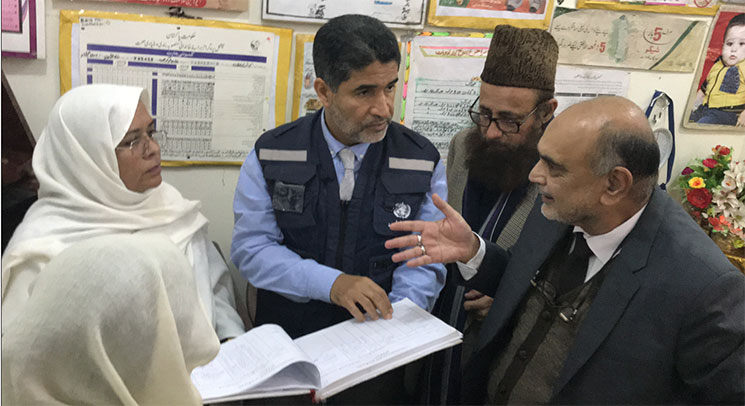
Islamabad, Pakistan, 18 December 2018 – Dr Ahmed Al-Mandhari, WHO Regional Director for the Eastern Mediterranean, has concluded his first official visit to Pakistan by applauding efforts to boost health and health care in the country.
The two-day visit, from 17 to 18 December 2018, included meetings with several government officials and field visits aimed at enhancing mutual collaboration between WHO and the Government of Pakistan. The Regional Director was accompanied by Dr N’ima Saeed Abid, WHO Country Representative ad interim, and Dr Zafar Mirza, Director of Health System Development at the WHO Regional Office.
On the first day of the visit, the Regional Director paid a courtesy call on the President of Pakistan, HE Dr Arif Alvi. Dr Al-Mandhari applauded the Government's unwavering political will and commitment to universal health coverage (UHC) and polio eradication. HE Dr Alvi noted that health and education are strategic priorities of the new Government, which is firmly committed to improving the social conditions of the people and investing in human development.
Federal Minister of Health HE Mr Aamer Mehmood Kiani received the WHO Regional Director at the Ministry of National Health Services, Regulations and Coordination. HE the Minister thanked WHO for its continued support for Pakistan’s public health endeavors and vowed to enhance mutual collaboration in priority health areas.
The Regional Director briefed the Minister on his Vision 2023, which calls for solidarity and action towards achieving the goal of health for all by all in the Region. He commended the Ministry’s leadership in polio eradication and also advancing the Government’s UHC agenda. He congratulated the Minister on a recent breakthrough immunization campaign which saw more than 38 million children vaccinated against measles.
Dr Al-Mandhari also acknowledged the Ministry’s initiatives to curb population growth, expand health insurance and strengthen family-based health care in selected districts in Pakistan. He welcomed the Government’s decision to impose a “health tax” on tobacco and sugary drinks, with the revenues generated being earmarked for health. He also noted joint plans of WHO and the Ministry for further advocacy and action towards high burden communicable diseases such as Tuberculosis and Hepatitis.
Dr Assad Hafeez, Director General of Health briefed the WHO delegation on the Government’s 5-year National Action Plan for Health, which was found in great harmony with WHO global and Regional strategic priorities. In a ceremony attended by HE Federal Minister of Health and other officials, Dr Al-Mandhari handed over 32 vehicles donated by GAVI to Extended Program of Immunization (EPI) in Pakistan to strengthen health service delivery.
Later that day, Dr Al-Mandhari was joined by Ms Jean Gough, the UNICEF Regional Director for South Asia. The Regional Directors visited the National Emergency Operations Centre (EOC) for Polio Eradication in Islamabad, where they were received by the Prime Minister’s focal person on polio, Mr Babar Bin Atta, and Dr Rana Muhammad Safdar, Polio National Coordinator, who gave an in depth briefing on the progress and challenges of the country’s long journey towards polio eradication.
“Pakistan has made remarkable progress in protecting every child from polio, bringing down the number of children paralyzed by the virus from almost 20,000 each year in the early 1990s to only eight cases so far this year,” WHO’s Regional Director said. “Now, we must end polio once and for all; WHO, together with our partners, will spare no efforts in supporting Pakistan to make this happen.”
The second day started with a field visit to a Basic Health Unit (BHU) and a Health House in Shah Allah Ditta, where a family practice project is being piloted. Dr Al-Mandhari applauded the heroic efforts of polio frontline staff and Lady Health Workers (LHWs), who play a crucial role in ending polio and providing essential health services to community members, particularly mothers and children.
The day proceeded with meetings with Federal Minister of Finance HE Mr Asad Umar and HE Mrs Kanwal Shauzab, Parliamentary Secretary for Planning, Development and Reforms. In the discussions, the Regional Director reiterated his vision that Health For All cannot be achieved by the Ministry of Health alone, but required input from everyone. Both high officials reiterated the entire Government’s firm commitment to UHC as a priority, and noted that HE the Prime Minister has already developed plans to increase the health budget and to further invest in the health workforce. “It’s indeed heartening to see the whole-of-government solidarity, commitment and action for health in Pakistan. WHO stands ready to provide support, build technical capacity and work with all ministries and stakeholders in this grand endeavor,” said Dr Al-Mandhari.
Addressing participants at a Training of Trainers (ToT) workshop on Infant and Young Children Feeding later that day, the Regional Director noted the importance of nutrition in fulfilling physical and psychological health needs of the children. He urged to focus more on addressing stunting as a serious public health matter in the country, which has also been given special attention by HE the Prime Minister.
Dr Al-Mandari concluded his visit by meeting with the staff of WHO country office in Pakistan. He expressed his gratitude to the country team and shared his belief that the staff members are the Organization’s biggest asset. “Pakistan is witnessing a historical undertaking in the country’s public health arena. All the ingredients of success are there: political will at the highest level, the commitment of the entire Government and the technical competence, to which we have to actively contribute. We have to make best use of this momentum and work with the Government and partners to achieve health for all by all,” he said.



